Category Archive for Fashion
Travel guide to visiting Lake Bled, Slovenia! Romantic castle & island near Ljubljana, Slovenian cuisine at Tito’s Palace.

I’ve been asked: as a travel blogger, do I get jaded about traveling? Does going to new countries become boring at some point?
The short answer is no. Every time I visit a destination, especially one I know little about, I end up finding unexpected gems.
This was exactly my experience at Lake Bled in Slovenia. Who knew that this unassuming country would have a lake and castle straight out of a fairytale?

Photos of Lake Bled are stunning enough, but the views are even more impressive in the flesh.
It’s the definition of picture perfect: a tiny island with a white church, in the center of an emerald lake. The isle surrounded by the lush green Julian Alps, and Medieval-era Bled Castle.
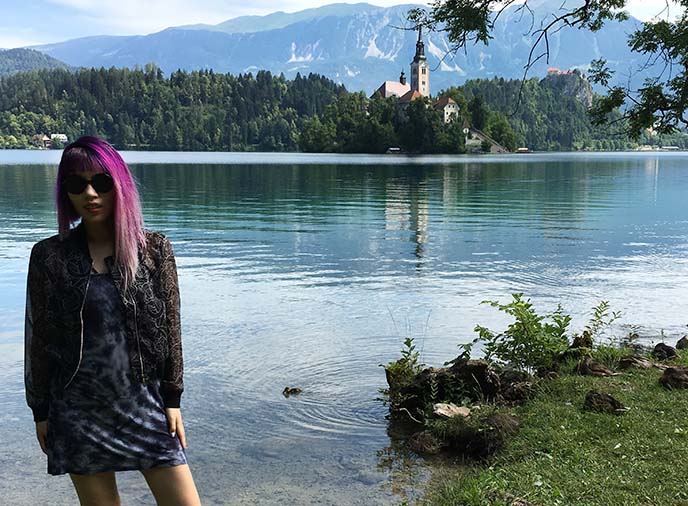
You’ll recall from my introduction post that Slovenia is a tiny country, which makes it easy to travel around. From the capital of Ljubljana, it’s less than an hour’s drive to Lake Bled.
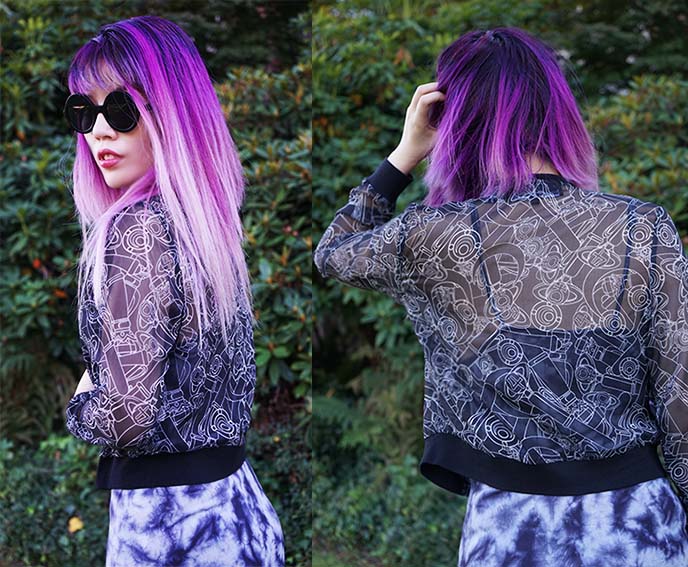
That day, I wore my new blue tie-dye dress by Disturbia, the Goth and alternative fashion label that is one of my favorites.
My sheer Sailor Moon jacket is perfect for warm weather. I got it in Hong Kong, and love how the color is neutral, and the wands and crescent moons are subtle (but Sailor Moon fans will understand the references!)
Shop more fashion from Disturbia by clicking the pictures below
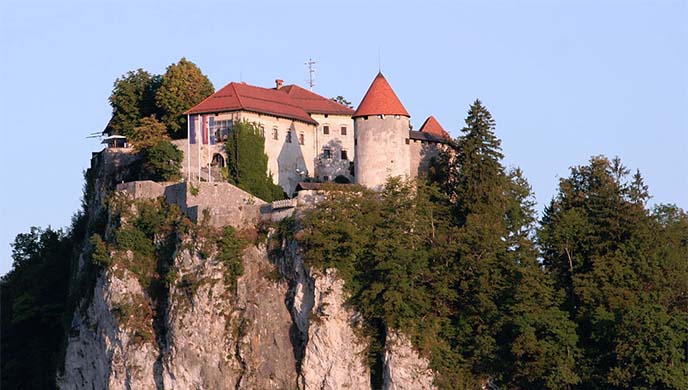
Bled Castle is the oldest in Slovenia, and one of the country’s proudest attractions. Since it’s easy to access Bled from Ljubljana (there are also buses and trains), many visitors take a day trip to the lake.

I walked around the towers of Bled Castle, imagining that I was a European princess. Inside, I saw the silver armor of knights, spooky bones and other relics from the Middle Ages.
There’s a crazy Medieval toilet in one room: the hole is a precarious drop down below, like the Vale’s Moon Door in Game of Thrones.

Bring your camera. There are outstanding views of Slovenia, from the castle windows and terrace.
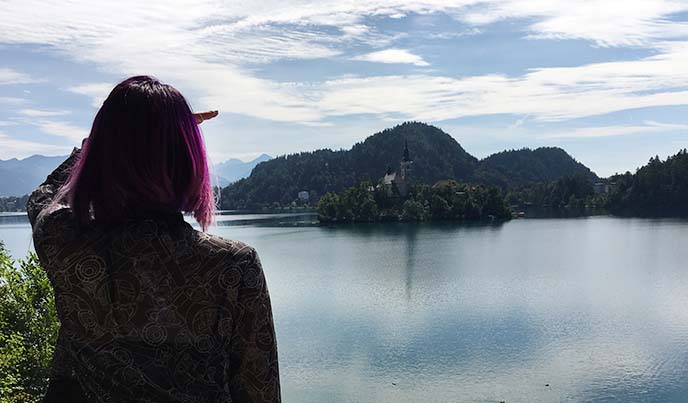
It’s obvious why Lake Bled is a favorite destination for romantics. The location also leads into Triglav National Park, where you can take part in all types of outdoor adventures.
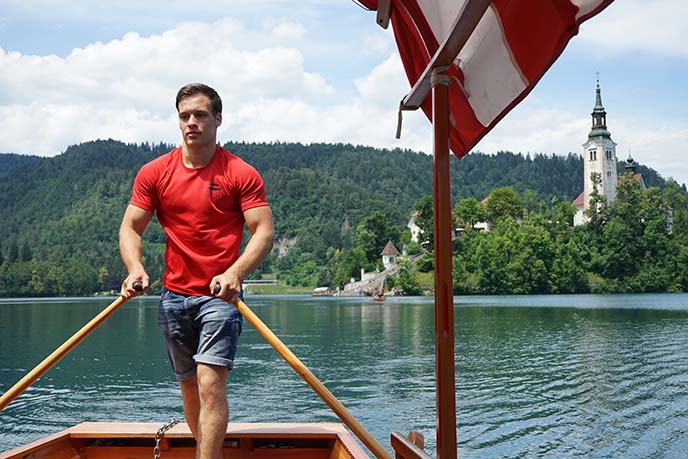
Time to explore the little island on Lake Bled. The traditional way to get here is by pletna, or a gondola with paddles.
As you can see, it takes a lot of muscle to row, row, row the boat!

The Church of the Assumption is the focal point of island. Excavations revealed a chapel that dates back to 9 AD, but the current one was built in 1698. Inside, there’s a “wishing bell”: you pull on a long rope, and it rings the bell at the top of the steeple.
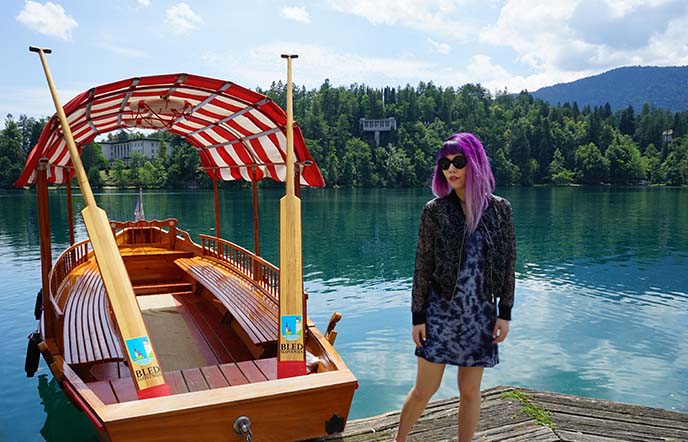
Lake Bled is not one of Europe’s most known attractions, and this is a good thing. You’ll feel as if you stepped into the olden days, and the experience doesn’t feel commercialised.
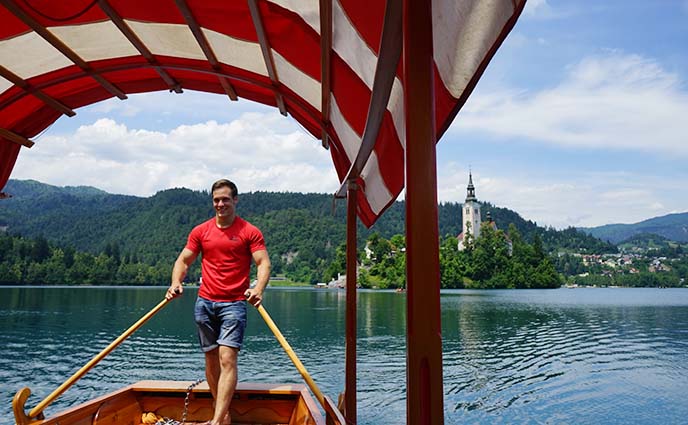
The same well-muscled fellow took us back to the shores. He does hundreds of back-and-forth rows per day – what a workout!

I was glad to have the pletna to myself. We shot a 360 degree virtual reality video on the boat, which we will release soon.

I looked back, and the island faded into the distance. Many Slovenians get married here. According to local tradition, if a husband carries his new bride up the 99 steps to the church, then a happy marriage is guaranteed!
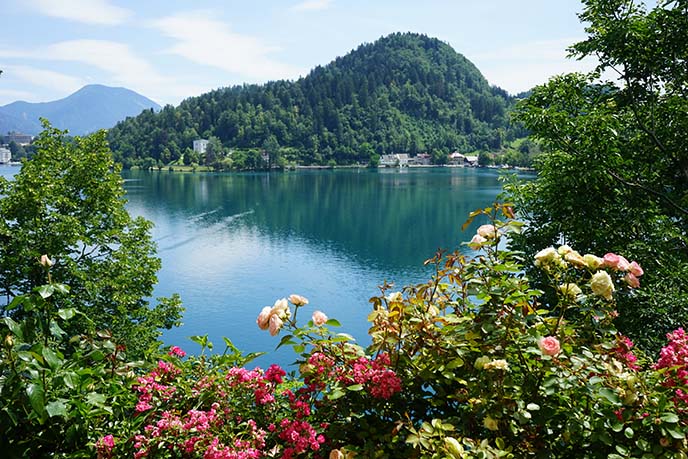
But even if he crashes and burns, romance is in the air, with pink flowers and picturesque frames like this.
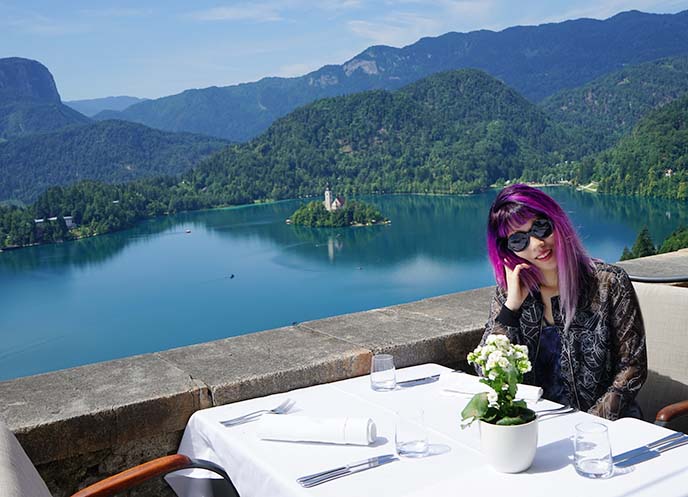
Even though I didn’t do any rowing, I was ready for lunch. At Lake Bled, dining comes with a 5-star view.

Our guide Ales took us to Vila Bled, which used to be Tito’s palace. President Josip Broz Tito lived here, during Slovenia’s time in Yugoslavia. He was known as a “benevolent dictator”… perhaps the beauty of Lake Bled kept him from harsh ruling!
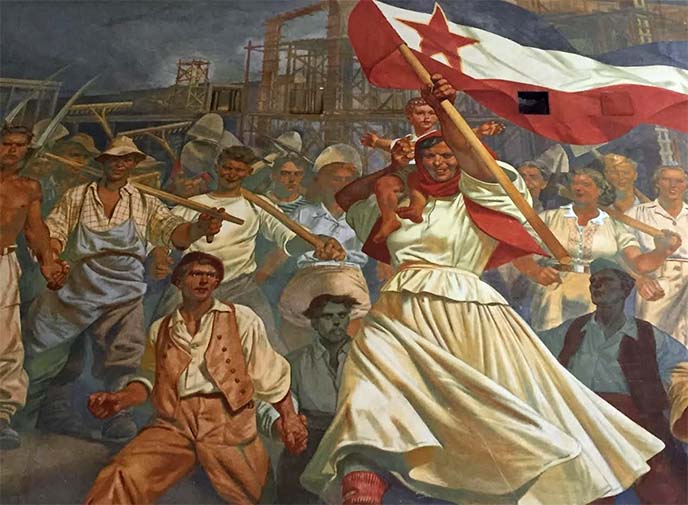
We walked through Tito’s decadent palace. One of the rooms had a giant Soviet-style mural, featuring hardy workers waving red star flags and sickles.
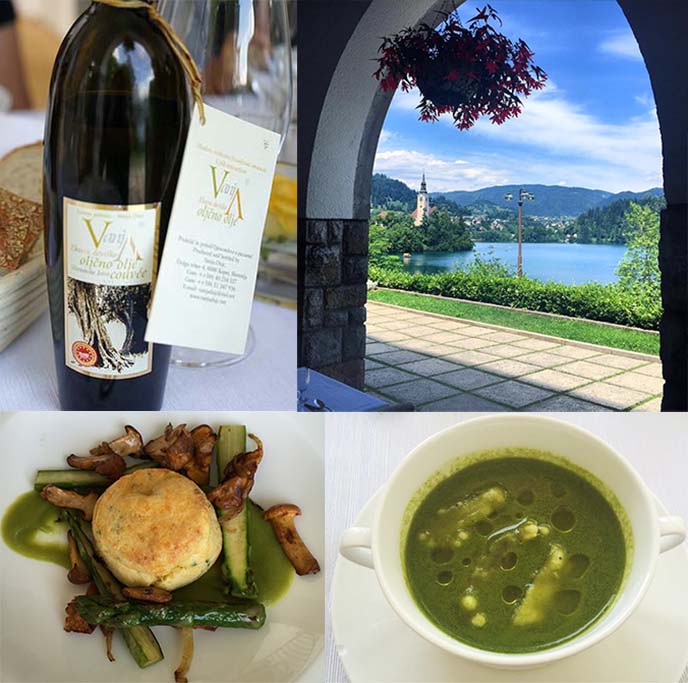
We sat down at a table in his courtyard — you can’t beat a view like this. My filmmakers and I started with fresh juices, asparagus soup, and a feta and vegetable souffle. Even the simple brown bread, dipped in Slovenia’s best olive oil, was beyond this world.
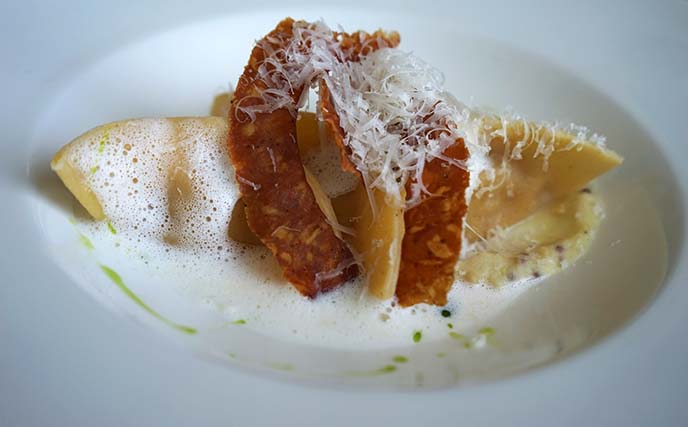
As I mentioned in my Portoroz post, there are lots of Mediterranean influences in the local cooking. This starter, a ravioli with parmesan, was executed with as much finesse as anything I’ve eaten in Italy.
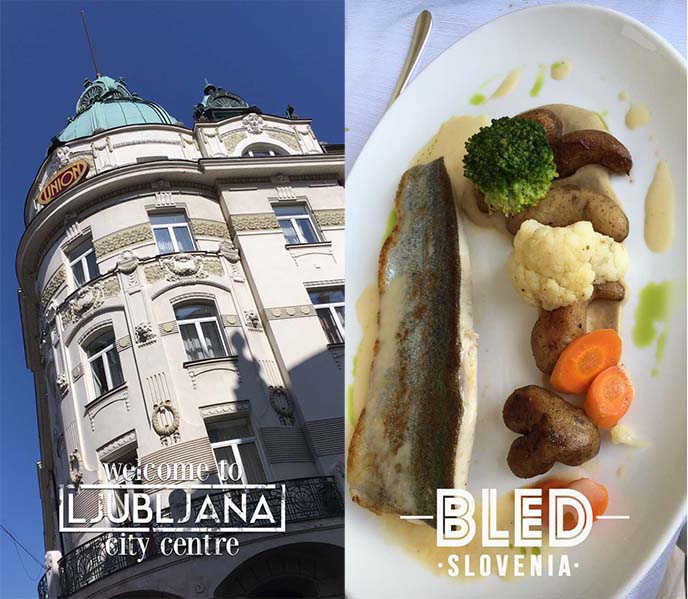
If you’ve been following me on Snapchat (@lacarmina), I’m sure you were drooling at the food we ate that day. Trout is outstanding in Slovenia, and I ordered it multiple times during my journey. As you can see from the stamp above, Vila Bled’s version was moist and colorfully presented with fresh vegetables.

Everywhere we went, Slovenian food was outstanding. At Gostilna pri Mari in Piran, an older local couple brought out plate after plate of incredible seafood. We started with octopus and squid carpaccio, moving on to squid ink risotto and penne with cuttlefish, and an entire grilled seabass.
Although you rarely hear of Slovenian wines, the local varietals are as complex and delicious as the ones produced in neighboring Italy and Croatia. I’m holding one of their dry, white wines from the Littoral region.

From Bled, we drove to Vila Podvin in the village of Mošnje Radovljica. This was a bed and breakfast inn to remember: the owners are proud of their heritage, and display Slovenian crafts in the lobby. We relaxed in clean and quaint rooms, then went downstairs to the garden — to experience their award-winning Slovenian restaurant.

At Vila Podvin, the dishes are “New Slovene” masterworks by Chef Uroš Šteflin. He reawakens forgotten Slovenian recipes, with modern and creative techniques. We started with a unique soft boiled egg appetiser, followed by either lamb or trout in nuanced, naturally-flavored foam. One of the best meals of our entire trip.
We even woke up early for the breakfast at Vila Podvin, a mix of homemade thick yogurt, fruits, farm eggs and other European delicacies.

Like Elaine on Seinfeld, I don’t like to use the word “breathtaking”… but for Lake Bled, I’ll make a happy exception! Although my film team and I have been to many beautiful places around the world, this under-the-radar destination took our breath away… awayyy…
(All photos by Melissa Rundle and Eric Bergemann of Borderless Media).

I wave goodbye with the national flag of Slovenia. The coat of arms is a shield with the image of Mount Triglav, the country’s highest peak. Below are two wavy blue lines representing the Adriatic Sea and local rivers, and the colors go back to Medieval times — like the castle where I’m standing.
Had you heard of Lake Bled? Wouldn’t you like to visit?

PS: Shopbop is having a major sale right now – only til Oct 14th at midnight Pacific time! You can just enter code “MAINEVENT16″ for up to 30% off. My favorites are above: a leopard skull sweater, Goth skull print leggings, and this bat sweatshirt that is perfect for fall.
PPS: If you like what I’m wearing, shop more Nu Gothic fashion from the same brand (Disturbia) with a click below. And I’ve added new items to my online shop, including h.Naoto, Banana Fish, rocking horse Lolita shoes. Come see it here.
SHARE & COMMENT
Royal Mansour Marrakesh: world’s most luxurious hotel! 5-star Morocco riad, Michelin restaurant.
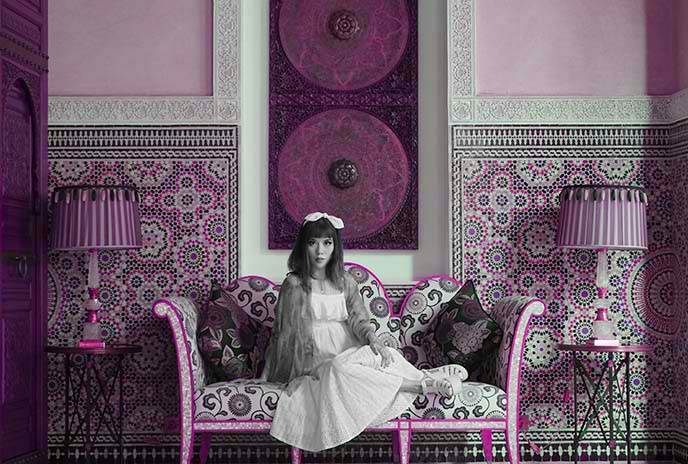
Come aboard my magic carpet, and fly with me through a Moroccan fantasy hotel: Royal Mansour Marrakesh!
My film team and I have been invited to stay at many wonderful places, but Royal Mansour was unlike anything we’d experienced. If you’re a dreamer like I am, inspired by the art and culture of Morocco, then you’ll understand why this five-star riad is so special.
(PS: don’t miss out on my current Japan travels, which you can see on my social media @lacarmina and linked in the top right sidebar.)
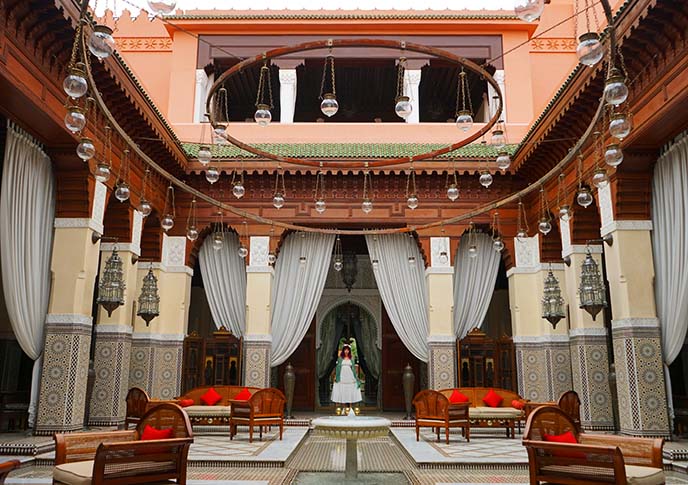
It sounds like a tale from 1001 Nights: Royal Mansour was the vision of King Mohammed VI, who employed over a thousand craftsmen and spared no expense to make this dream a reality. (Book a stay at this hotel & learn more here.)
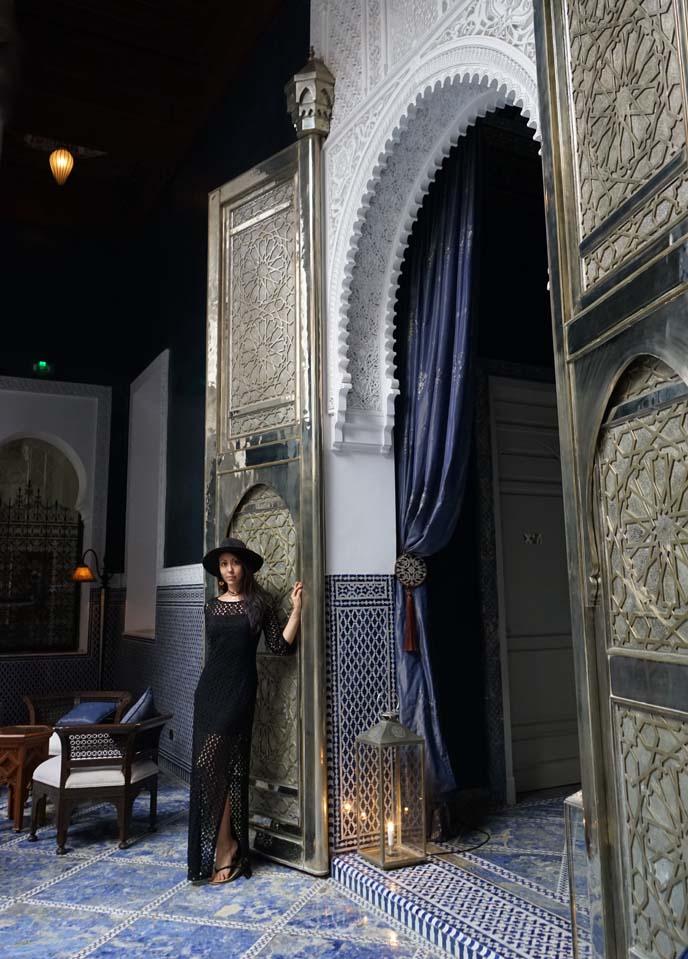
My friends and I felt like Scheherazade, wandering the king’s palace in a daze. In a single picture, you’ll find a million details: the tiles, marble, gold, and carved arches.
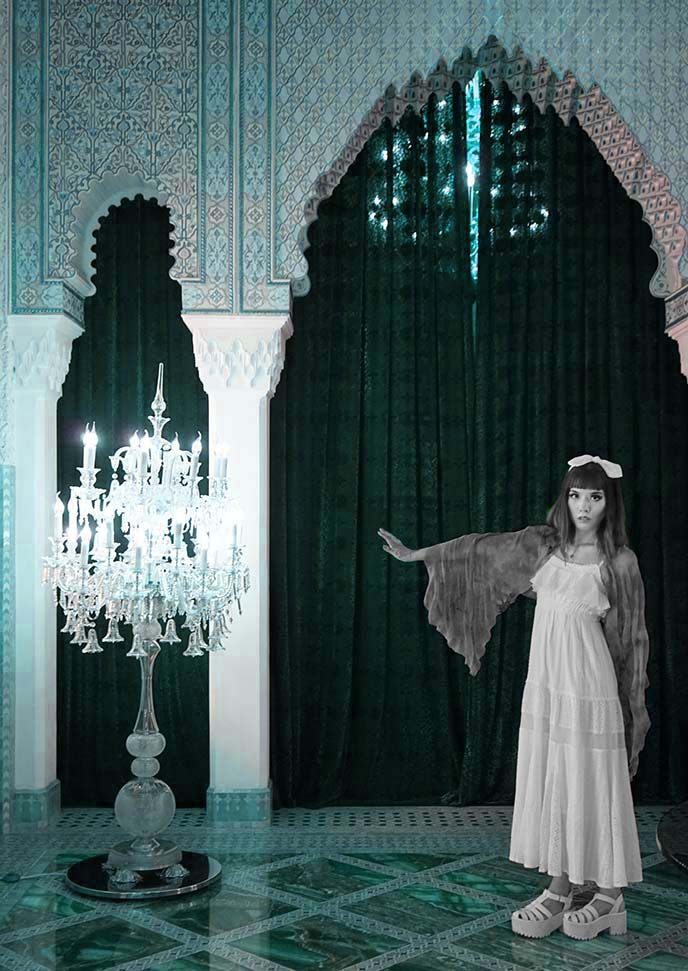
You can imagine the fun we had, exploring the riads and hidden lounges, and taking photos along the way. Each area was lit to perfection — such as this reception area with a glowing chandelier.
The space made me feel like Alice in Wonderland, so I wore a romantic white dress by Liz Lisa (I’m currently selling it on my Depop, in case you would like it!). I played around with some color edits, to emphasize details of the architecture.

Let’s start from the entrance. Marrakesh’s Royal Mansour is only minutes from the bustling Square of the Dead, but the atmosphere couldn’t have been a bigger contrast. We drove through peaceful, opulent gardens and arches until we reached the grand entrance.
An adorable “lobby girl” greeted us, wearing a red cap, military-style outfit and white gloves.
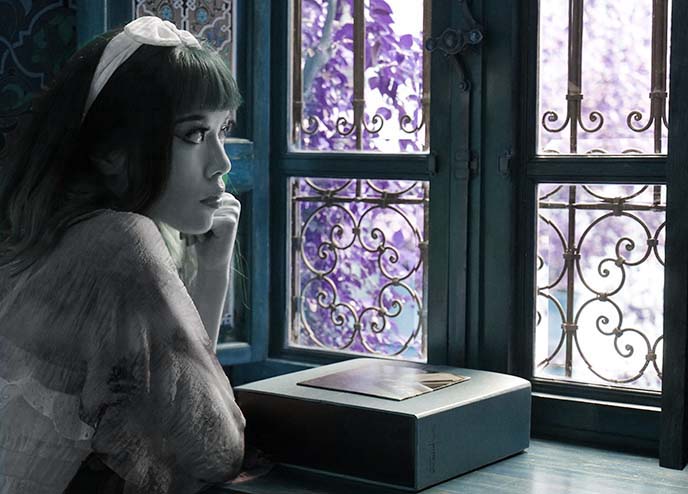
At Royal Mansour, guests don’t stay in rooms. They get their very own three-storey riad, or Moroccan house with an open courtyard.
My jaw dropped when I realized I had one of the 53 private riads all to myself. I stepped past a blue-tiled foutain, into a living room furnished with the finest furniture.

The riad was fit for a Moroccan princess: a kitchen, rooftop terrace with a swimming pool, and my own elevator. Every detail, from the antique star lamps to the cushions with glass beads, was exquisite.
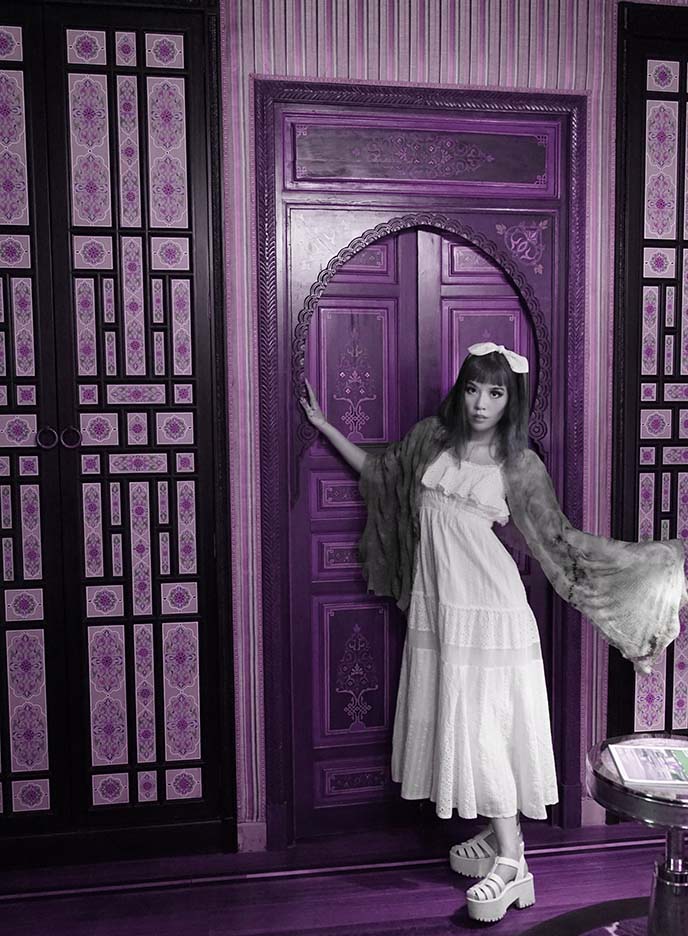
My bedroom looked like an illustration from a centuries-old storybook — yet it had all the latest amenities including free movies. I spent an hour soaking in the giant marble tub that lies behind these curved wooden doors.
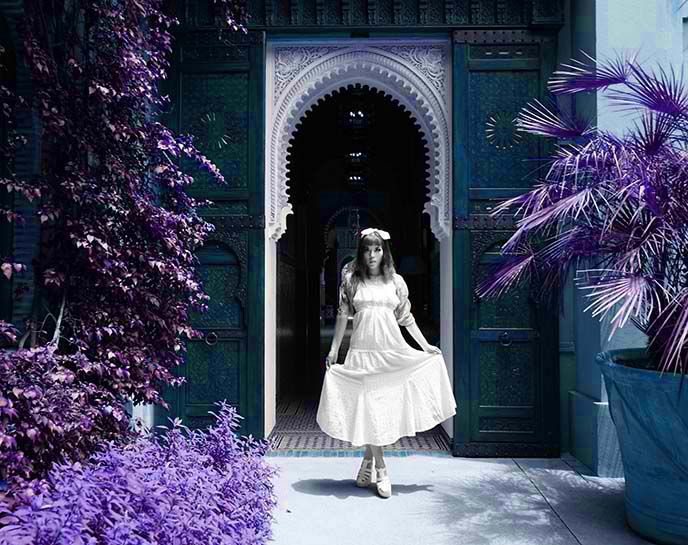
Outside, the gardens were blooming with palms, purple bougainvillea and pomegranate trees. The landscape artist – Spain’s Luis Vallejo – also designed the gardens at the Alhambra palace in Granada (which we visited).

My long white dress added to the dreamlike feeling of the space. My platform sandals are these ones by YRU.
(I’m currently selling both of these items, plus more from my closet at discounted rates. Come take a look at all my sale listings, and email me if you’d like to get anything!)

The heart of the hotel is its main courtyard, a palatial arrangement around a cross-shaped fountain.
Mohammed VI began building Royal Mansour in the 2000s, and brought in the “crème de la crème” including architecture firm OBM and the French interior designers 3BIS. He spared no expense. The total budget of the project has never been revealed.
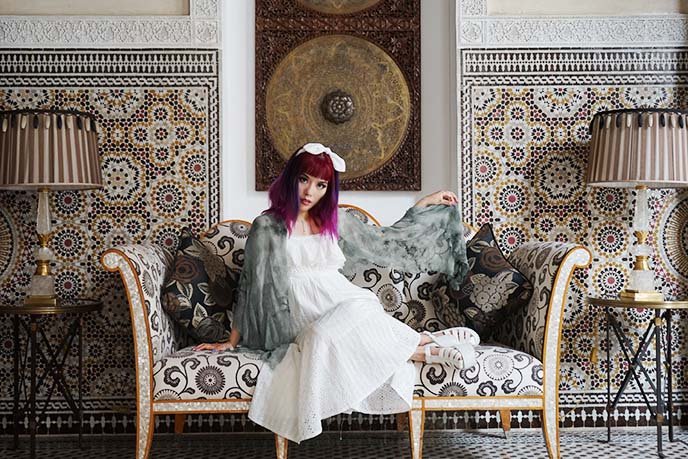
He wanted Royal Mansour to be a tribute to traditional Moroccan craftsmanship — so he hired over a thousand of the country’s best artisans. Each tile was handcut and placed, and every screen was painstakingly carved.
Imagine the effort that went into the zellige alone (the starburst-shaped mosaic wall) in the photo above…
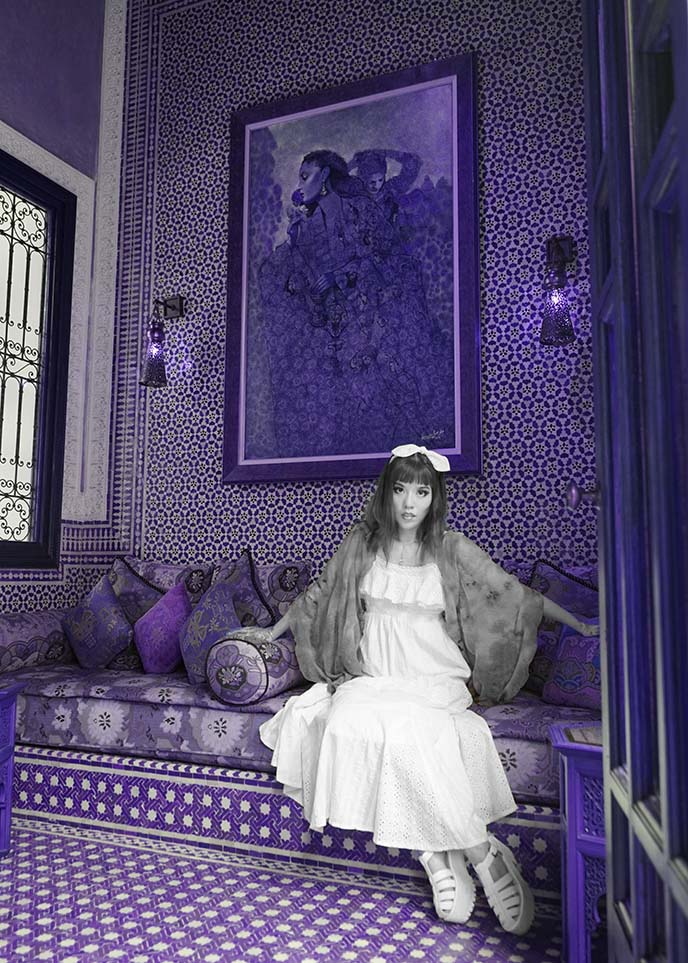
Around the courtyard, there were intimate curtained rooms filled with cushions and paintings. I ducked into this hidden space and closed my eyes, taking in the scent of jasmine and orange blossom.
I listened to birds singing from the room next door, water trickling through the courtyard, and the light strains of Berber music.

Every corner of the hotel delighted our senses, particularly the open-air courtyards. We walked up the stairwell and found libraries, cigar and cocktail lounges.
Royal Mansour is opulence in its subtlest form. The hotel never feels over-the-top, and yet each detail is pure luxury.

The King brought together the highest achievements of Moroccan culture in a single place: interior design, paintings, sculpture, gardens, food.

The cigar room was a perfect example of the hotel’s understated luxury. At first glance, it seems like an old-fashioned gentleman’s lounge.
But then you notice the film-quality lighting from handmade lamps, and the shelves of rare cognacs and cigars. (All photos by Borderless Media.)

We had the dinner of dreams at one of Royal Mansour’s restaurants, La Grande Table Marocaine. It’s overseen by Yannick Alléno, a chef with three Michelin stars.
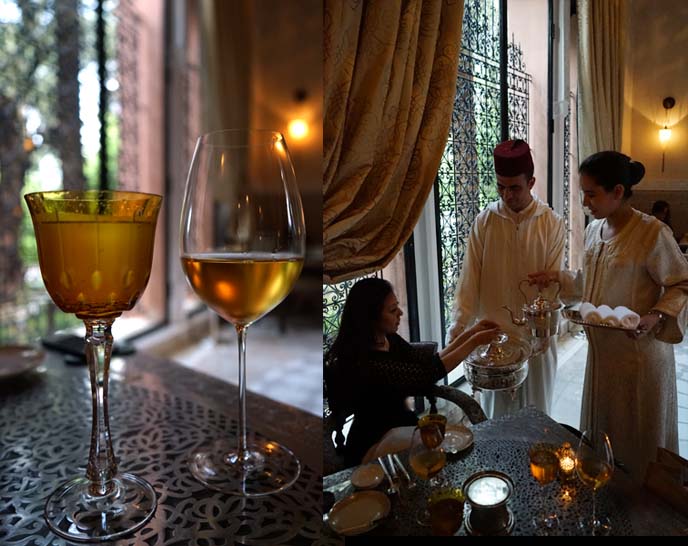
Seamless service, by servers in white gloves. They poured water over our hands as a washing ritual, and served us fine Moroccan wines — above was one of the best glasses I’ve ever had.
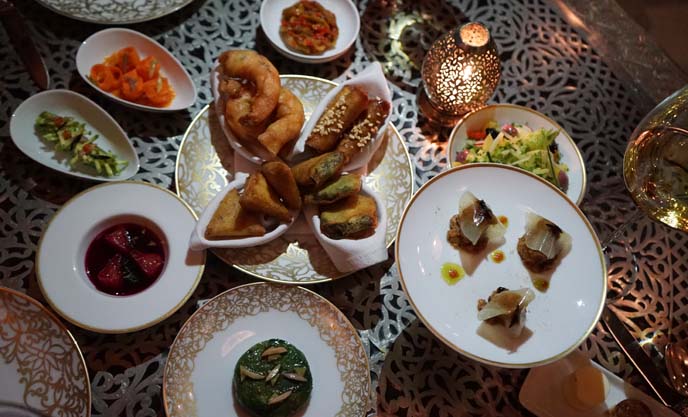
We started with our new favorite appetizer, a spread of Moroccan salads with honey and spices.
In the center, we had a selection of pastillas, or savory pies wrapped in crisp pastry. I’m still dreaming of the spinach and cheese one.
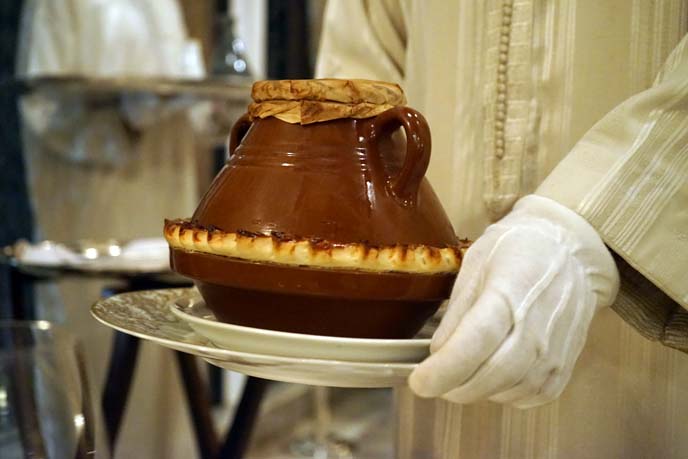
It was hard to choose our main courses, which were based on Moroccan tradition. Tagines, couscous, Moroccan gnocchi, fish served in clay pots. As expected, everything was 5-stars. If only we could have ordered the whole menu…
We loved the desserts with a molecular twist, including an orange blossom concoction with citrus caviar that burst in your mouth.

It was around my birthday… and the staff surprised me with these Grand Budapest-worthy cakes.
The hotel has a clever underground tunnel system that lets staff enter and exit the riad without disturbing your peace. One of them delivered these delights at the exact right moment, and then scurried back into the tunnel like a genie. Amazing.
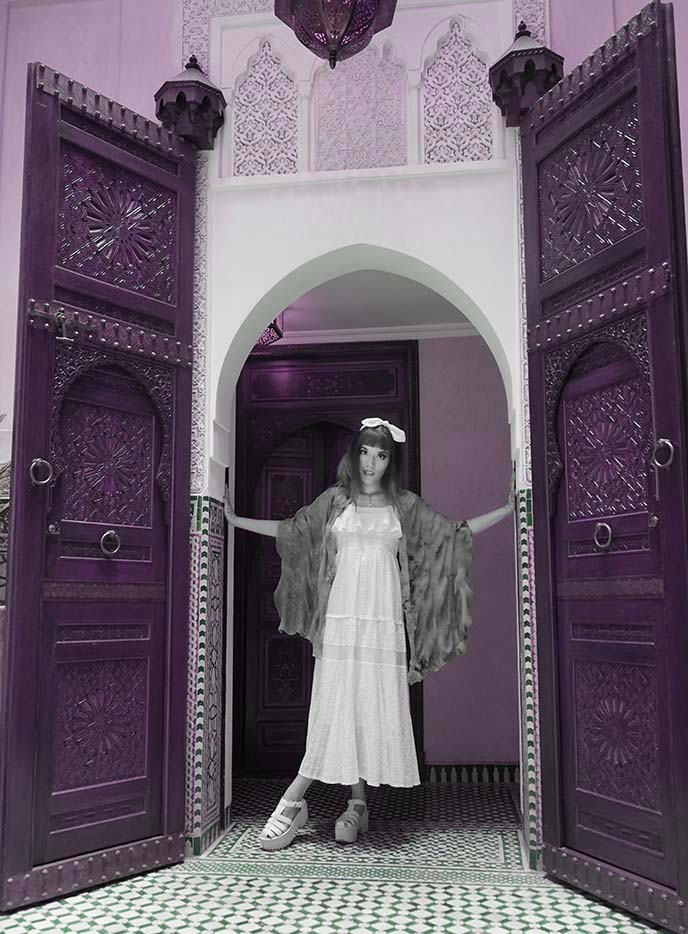
I hope the doors to your imagination are open, after this peek inside Royal Mansour Marrakesh — which deserves its title as one of the leading hotels of the world. The riad just re-opened after a summer renovation, and the gardens have become more enchanting than ever. Learn more and book this hotel here.
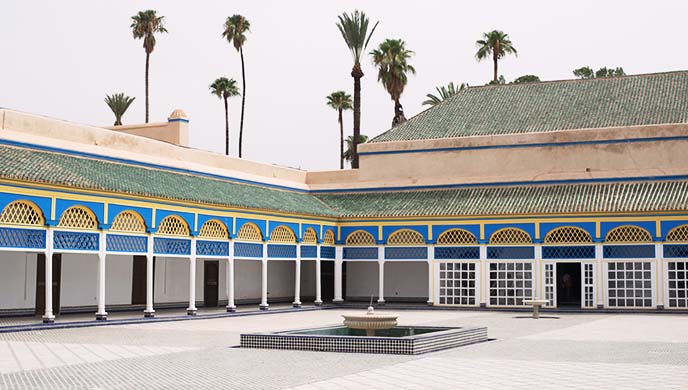
I leave you with a few shots by Joey Wong of Bahia Palace in Marrakesh, built in the late 19th century by a former slave who rose to become the Sultan’s Grand Vizier.
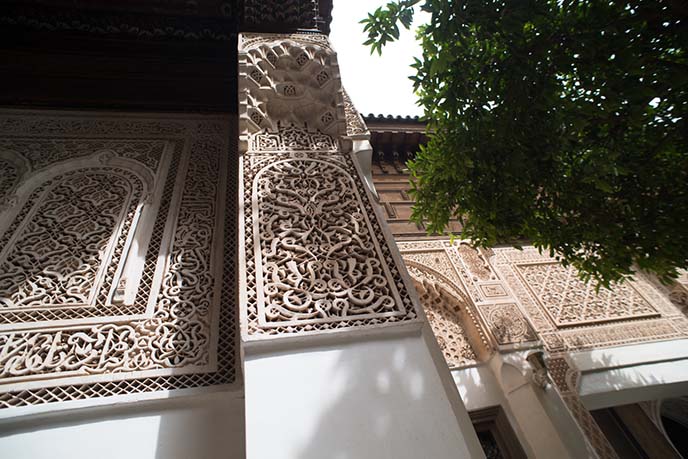
Bahia has a 2 acre garden and harem, decorated with these intricate Islamic reliefs.
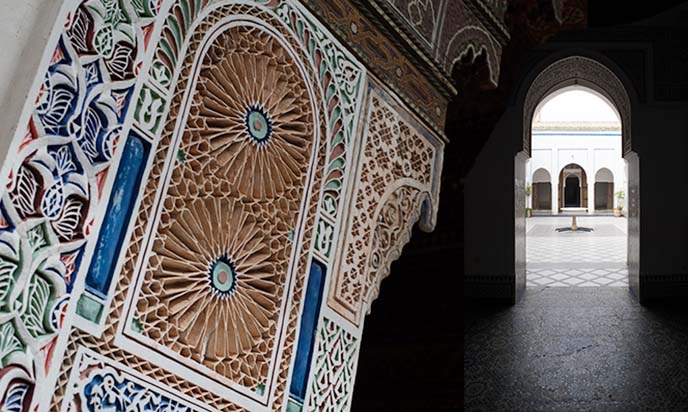
The detailing live up to the palace’s name, which means “brilliance.” Isn’t Moroccan architecture magnificent? I’d jump at the chance to come back and see more of the country.
If you’re planning a trip to Fez, Marrakesh and surrounding cities, check out all my travel tips and articles here. And watch me explore more of Royal Mansour in our Morocco travel video. To book a stay at my riad and see prices, click here.
PS: You’re welcome to Share and Pin these photos, if you felt inspired!

 LA CARMINA
LA CARMINA






